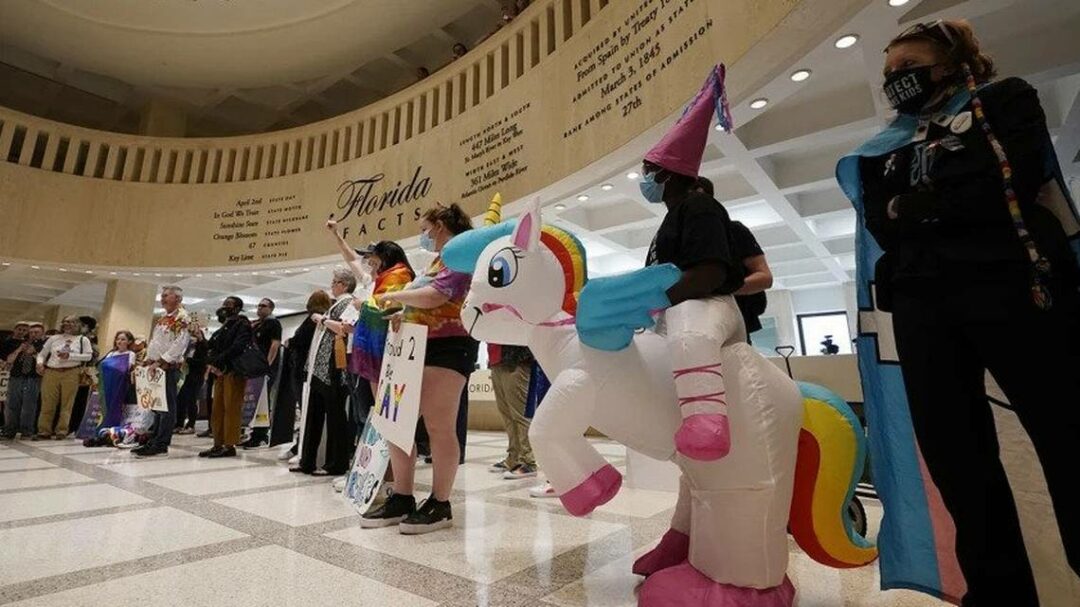
Don’t ignore effects of ‘Don’t say gay’ and ‘Stop WOKE’ on LGBTQ+ students of color |
Opinion BY BINTOU DIARRA, SOPHIA ORDONEZ, MELYSSA CRISTINO, ROBERT ROSALES AND COLOR OF CHANGE AUGUST 15, 2022 1:39 PM
In March, demonstrators protest inside the Florida State Capitol as lawmakers voted on a bill to forbid discussions of sexual orientation and gender identity in schools. WILFREDO LEE AP
In March, Florida Gov. Ron DeSantis signed the “Parental Rights in Education” bill — more commonly known as “Don’t say gay” — into law. The bill limits the discussion of sexual orientation and gender identity in elementary schools. As a result, school personnel and other parties will not be allowed to lead classroom instruction that does not align with state standards of “developmental appropriateness.” In addition, the bill requires schools to adopt procedures requiring parental notification of “specified information” that reinforces their right to make decisions regarding their children.
The bill has been in effect for just over a month, and advocates, activists and scholars must evaluate the ramifications — especially for LGBTQ+ youth of color. More specifically, we must consider how the policy will work in conjunction with other detrimental policies, like the Stop the Wrongs to Our Kids and Employees (Stop WOKE) Act, to further marginalize Black students and others of color.
Critics of “Don’t say gay” often center the negative implications for the mental health of LGBTQ+ youth. The potential effects are concerning, as LGBTQ+ youth already at greater risk for mental health conditions and suicidality. Critical to the promotion of emotional well-being are supportive environments: Several studies reveal that LGBTQ+ youth who remained friends after disclosing their sexual identity had higher levels of self-esteem and experienced fewer symptoms of depression and suicidal thoughts than those who lost friends after coming out. The extent of the positive effects varies with the scope of support. One study found that sexuality-related social support from parents, friends and community during adolescence all contributed to positive well-being into young adulthood in distinct ways, with parental support providing the greatest benefit.
The impact of acceptance and policymaking that upholds accepting environments underscores the significance of assessing policies like the “Don’t say gay” bill. Previous literature and data show that individuals in states with LGBTQ+ protection laws are less likely to report mental health issues, and experience improved health overall. Among the other correlates of nondiscrimination protections are more inclusive health care coverage, safer workspaces, and a lower level of substance use by LGBTQ+ adolescents. One thing is clear. For LGBTQ+ youth who are not out, the negative implications of the bill are glaring. Such policies ultimately divest youth of their personal agency, as it calls on professionals to disclose information — even if it means outing them to, possibly, unsupportive parents. Unlike the positive experiences noted, those of rejection contribute to additional mental health problems and reduced social support.
While “Don’t say gay” is damaging on its own, understanding its specific manifestation among LGBTQ+ youth of color requires an evaluation of how other policies, such as the “Stop WOKE” Act, will compound existing problems. The Stop WOKE policy limits the discussion of race and gender at school and other workplaces. It labels lessons regarding the historical legacies of racism, sexism and other forms of bigotry as forms of discrimination. The policy is likely to leave out important perspectives in the name of accommodating white people experiencing discomfort, even if it means overlooking the discomfort of students of color. The two policies will bar LGBTQ+ youth from freely engaging in conversations regarding their sexual and racial identities, which will inevitably diminish their self-expression and sense of belonging. Florida’s racist and homophobic policies come with a slew of problems for LGBTQ+ youth of color. We must consider the ensuing limitation of their personal freedoms, as the policies will work in conjunction to amplify the difficulty of engaging in discussions about race and homophobia.
Bintou Diarra is a medical anthropology major at Brown University. Sophia Ordonez and Melyssa Cristino are undergraduate students at Brown. Dr. Robert Rosales is an assistant professor of behavioral and social sciences at Brown. Color of Change is a national progressive nonprofit civil-rights advocacy organization.
Originally published at https://www.miamiherald.com/opinion/op-ed/article264401281.html

